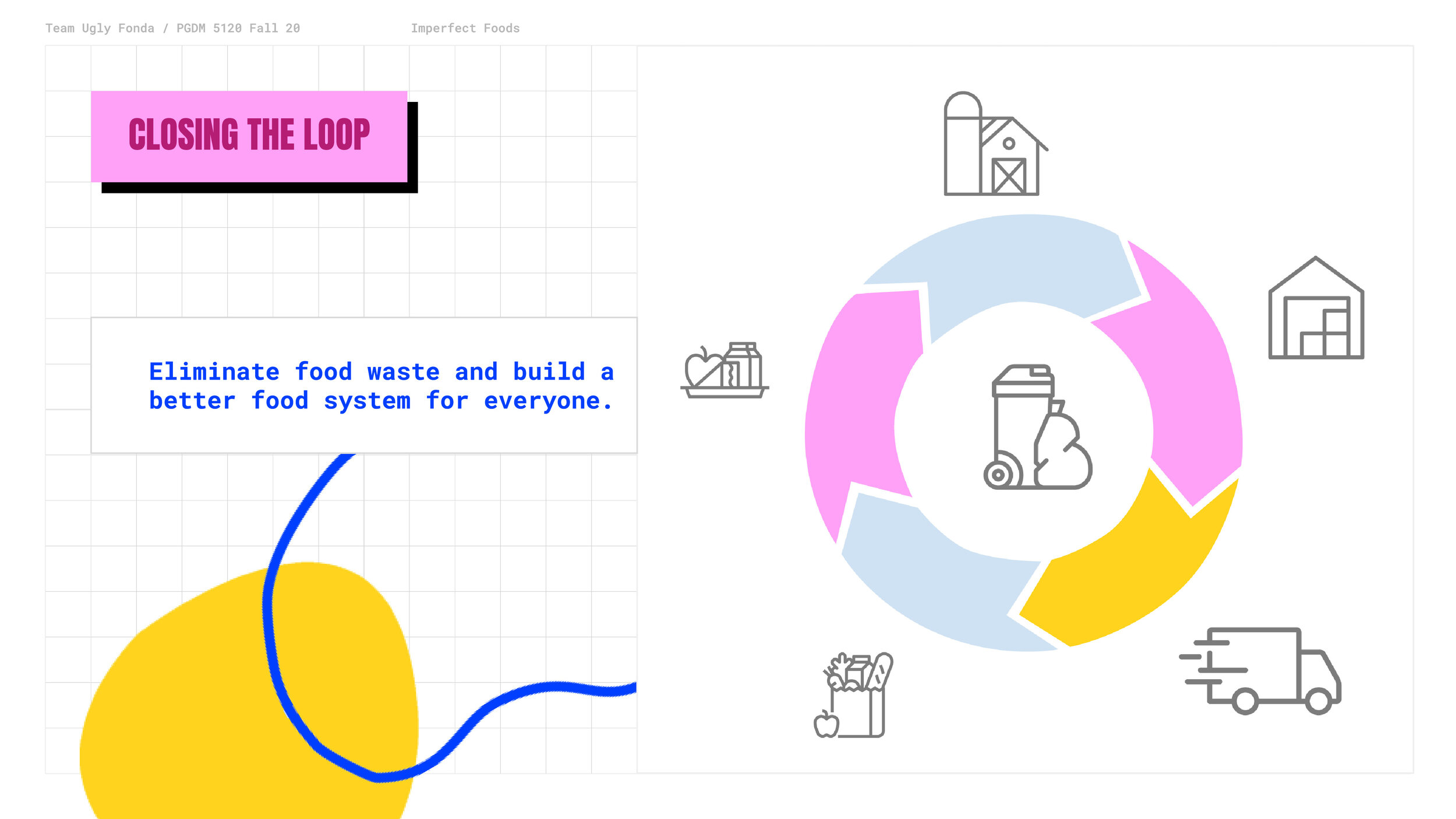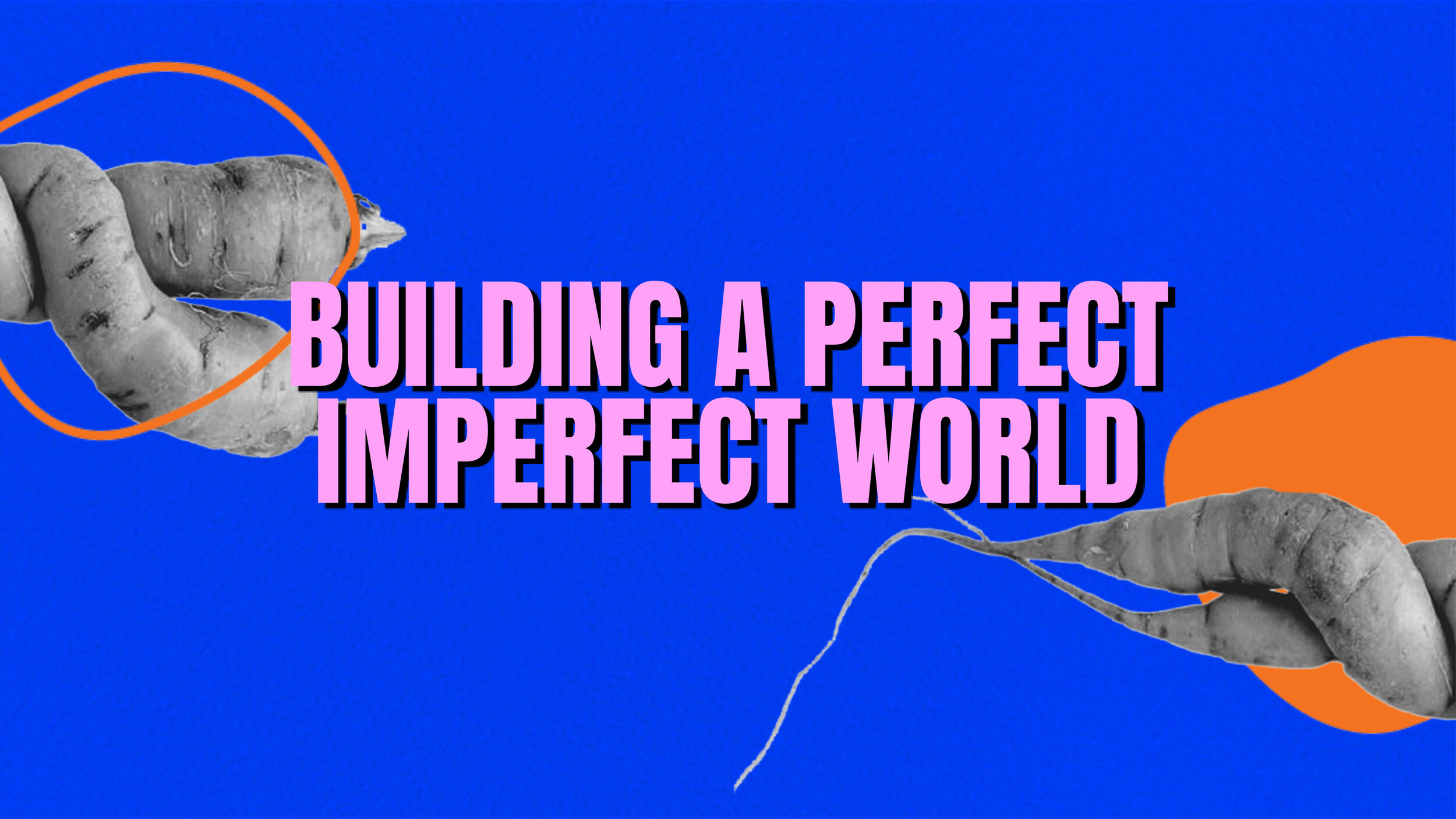
How Might We
How can Imperfect Foods expand its ventures while tackling the big food waste problem and become a leader in making a cyclical food system?
Research Approach
Ecosystem Map, Desk Research, Stakeholder Interviews, Surveys, User Personas, Customer Journeys, Data Analysis and Synthesize, Ideation, Rapid Prototyping.
Challenges
Customer Retention
Saturated Market
Investor Pressure
Solution
We designed an action plan towards ‘Building a Perfect Imperfect World’ by focusing on equity & quality when it comes to food system. We then created the following rapid prototypes:
Quality Control Chart
Compost System
Imperfect App
In-store Pop-Up
Youth Program
Results
Building a larger footprint with diverse customer segments
Closing the loop with a circular business model
Imperfect Foods- Growth Strategy
Design strategy, circular business model design, design research, and user-experience design
My Role: User researcher, UX Designer for the App, Presentation Designer
Collaborators: Andrew Lebowitz, Jared, John Jaimes, Kelly Ernst, Kenny Wu, Robert Jakacki, Sam Press, and Theresa Utanto
The Big Food Waste Problem
“Roughly one-third of the food produced in the world for human consumption every year - approximately 1.3 billion tonnes - gets lost or wasted”
“1 in 5 fruits and veggies grown in the U.S. don’t meet the strict cosmetic standards of grocery stores, often causing them to go to waste”
“In 2018, an estimated 1 in 9 Americans were food insecure, equating to over 37 million Americans, including more than 11 million children”
Objective
To research the VC funded private company Imperfect foods, understand its history, structure, and mission & values, to identify intervention spaces in the company and develop feasible and innovative solutions for growth.
To clearly delineate not only what the company claims to be but also how it is perceived in the world both with its products, and its customers & communications, to then propose initiatives that would impact positive change in the food system.
Develop a research plan
Conduct design and market research
Make rapid prototypes
Present a final report
Ecosystem Map
Our Approach
Contextual Research
What: Imperfect Foods is a produce box delivery service that offers customized boxes of surplus, cosmetically ”ugly” produce, affordable pantry items, and quality eggs & dairy in 100% recycled packaging at discounted prices.
Where: Available in 38 US states
When: Founded in 2015; raised total of $119.1 million USD as of May 2020
IF was born at the intersection of these 3 :
Platform-ization
Eco-conscious Movement
Rise of Millennials in the Workforce
Identifying The Problem
Starting with Imperfect’s Mission Statement, we established that one cannot eliminate food waste without first building a better food system for all. We wanted to further investigate how the company is delivering on their mission.
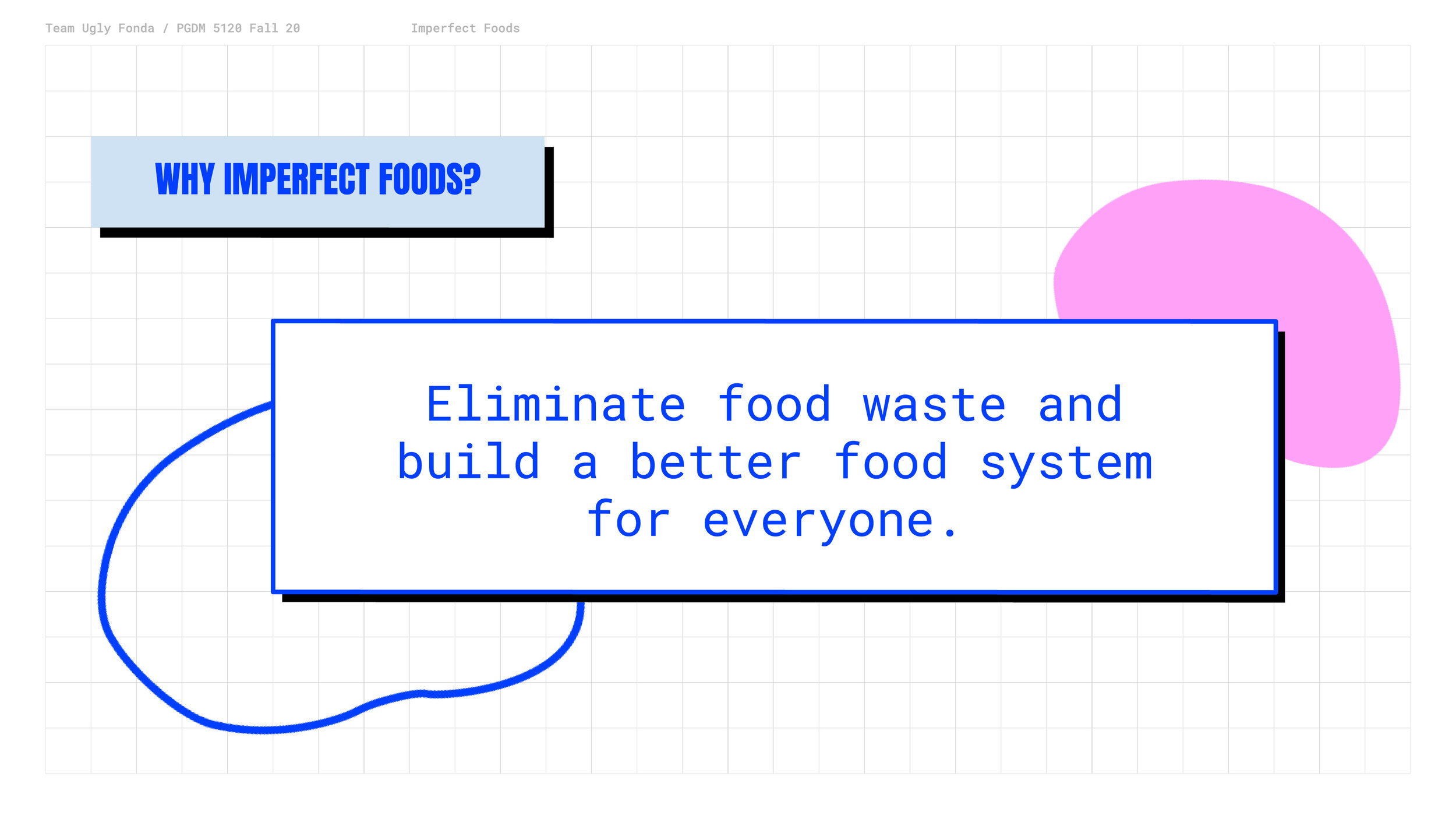
Imperfect Food Journey
The current linear food journey model from Farmers to Consumers involves food wastage at every step.
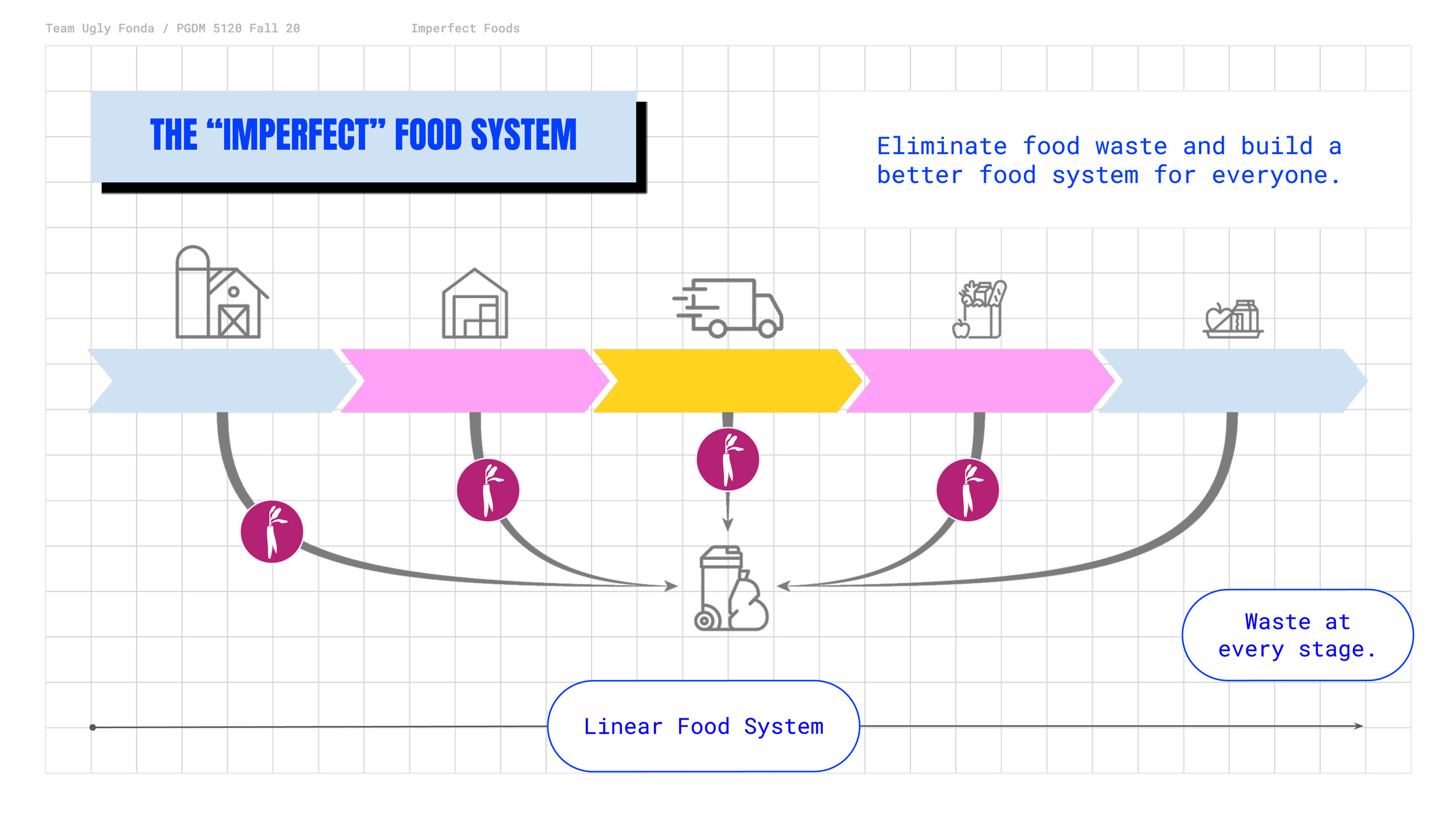
Current Imperfect Customer
By focusing on just the first half of their mission statement and claiming to ‘eliminate food waste’, Imperfect has acquired a significantly large customer base in the last 5 years.
Persona 1: Jessica wants to get groceries that are sustainable for family, self, and the environment.
Persona 2 : Wendy wants to be healthy and make conscious choices while she does it.
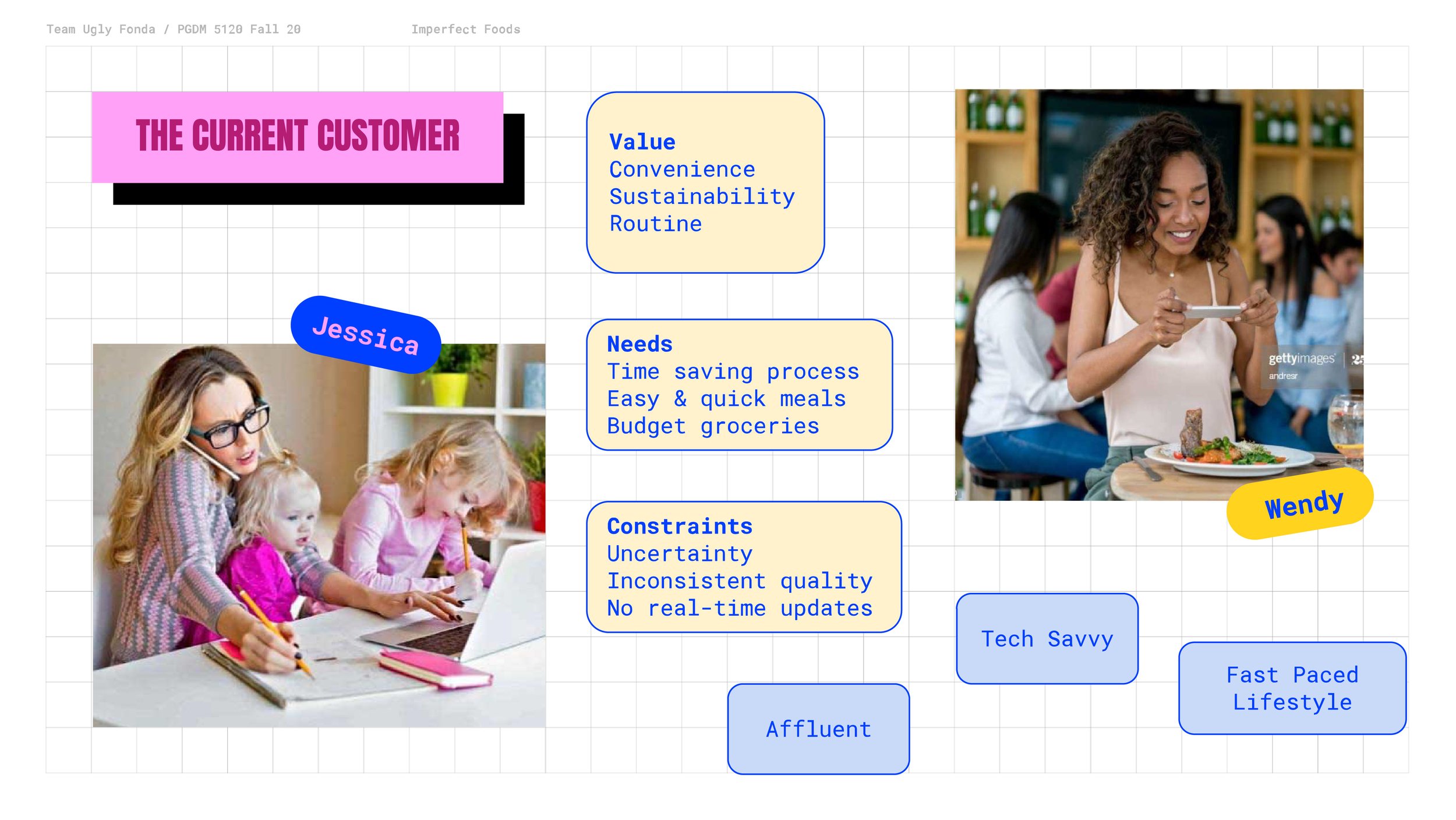
Imperfect Customer Journey
After conducting a survey & several interviews with current and potential Imperfect customers from across the country, we found that within the subscriber journey, there are currently high pain points that causes these subscribers to question coming back and results in high drop-out rates.
High pain points
Lack of user friendly ordering process
Issues with quality of produce
Only accessible through the web
Logistical issues
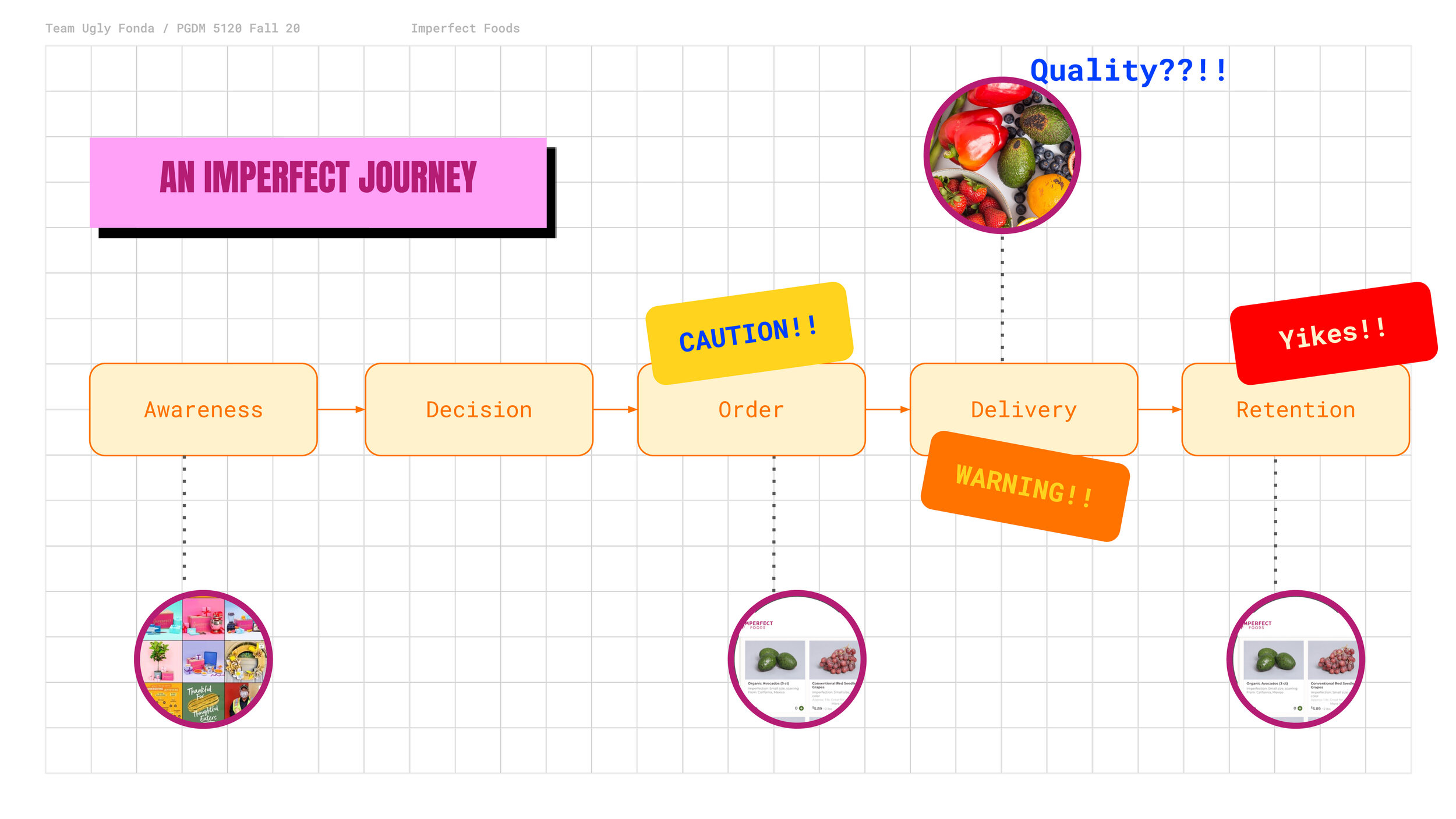
Challenges
We then identified three internal and external risks that Imperfect Foods is currently facing:
Customer Retention
Users have doubled from 200,000 to 400,000 in the last year. Quality control over produce is crucial to retaining these customers for future success.
Saturated Market
The marketplace for similar grocery box services and meal kits has become extremely saturated. To compete, Imperfect needs to go after new value propositions to set themselves apart.
Investor Pressure
Imperfect Foods has raised $137 million from venture capitalists and investors. Hence, there is a great amount of pressure to generate more revenue and broaden their footprint.
Ideation
Imperfect Foods is currently just another logistics company within the existing linear food system. How might we turn it into a company which is leading the industry with a circular food system model while minimizing food waste, and in turn delivering on the second half of its mission statement- ‘build a better food system for everyone’?
To grow and deliver on their value proposition, the Imperfect company must improve their throughput, refine their wastefulness, make fresh foods accessible to all. Hence, becoming a leader in making a cyclical food system.
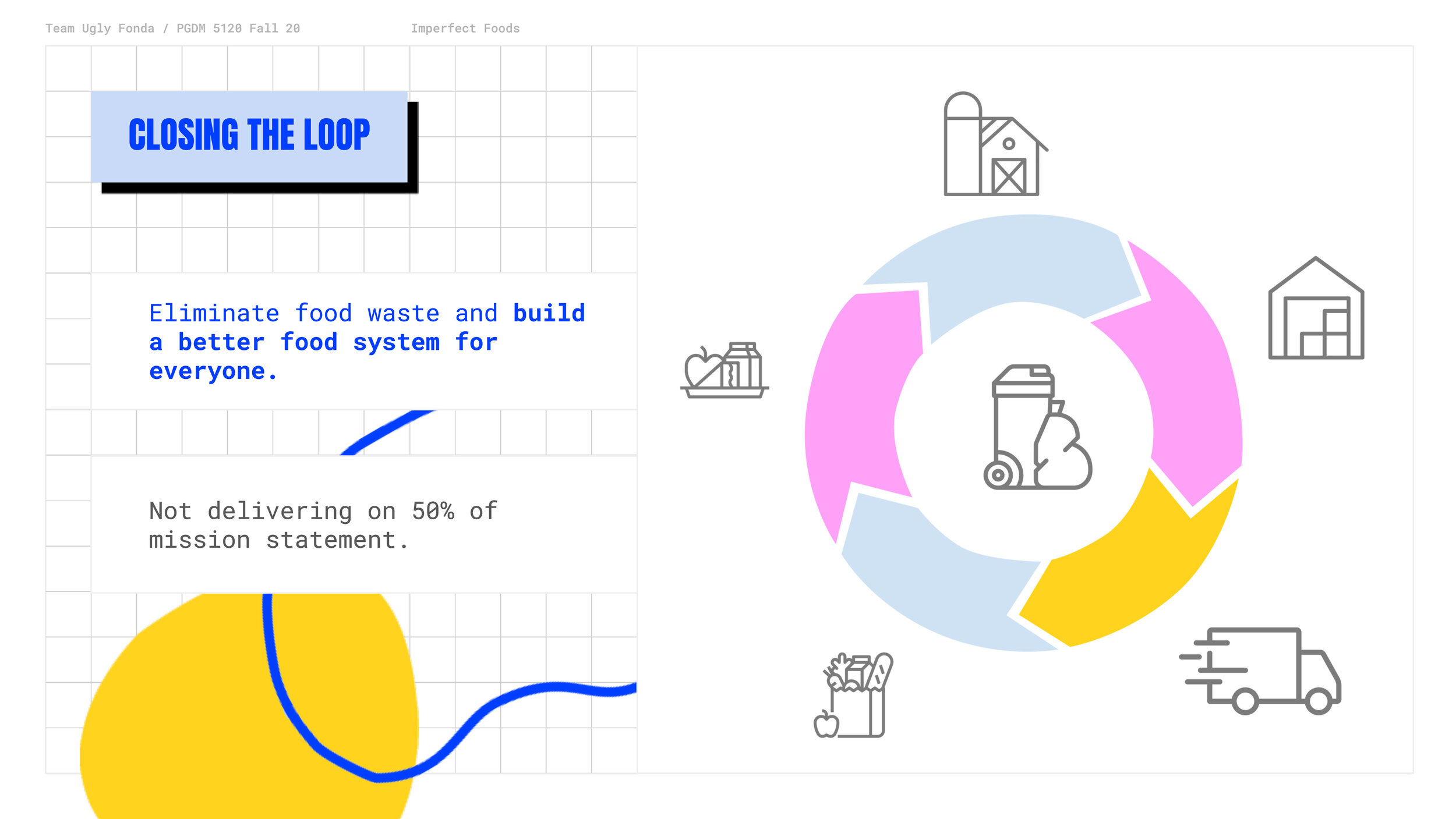
Areas of Opportunity
To ‘Close the Loop’ Imperfect needs to focus on ‘Equity & Quality’ via widespread education of food waste consumption and health. We identified three areas of opportunity- logistics, access, and community, that will help achieve this objective and support the company in delivering its mission statement. Equitable means will help expand its customer base, while quality control will aid in keeping current subscribers.
One country-wide issue that Imperfect can consider an opportunity to generate equity is food deserts. The South Bronx, NY is an example of one of the biggest food deserts in the USA.
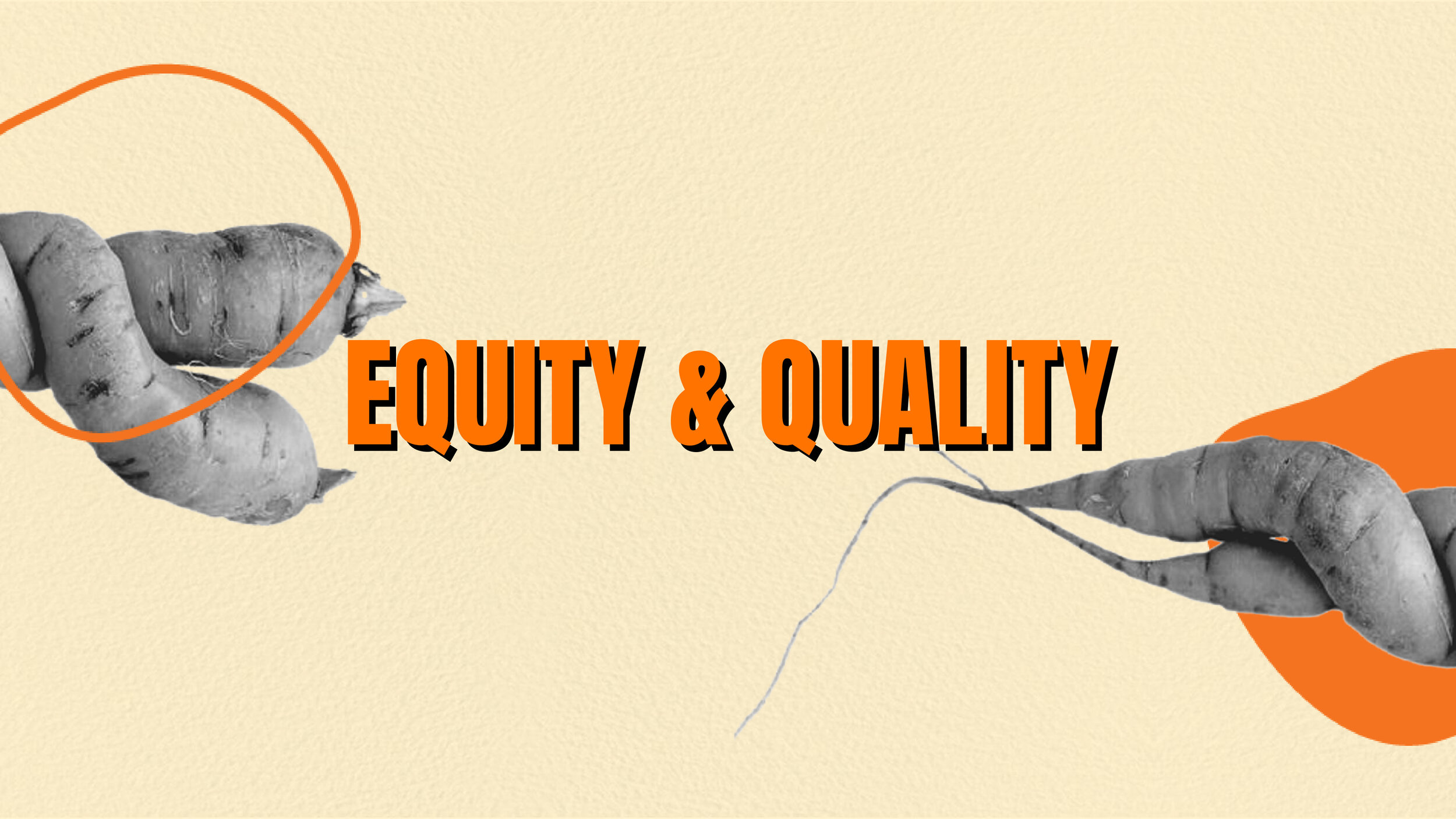
Rapid Prototyping
Overview
Through the strategy of shifting focus on equity & quality by improving logistics, access to food, community outreach programs, and awareness through education, Imperfect Foods has an opportunity of growing exponentially while making an impact.
Using Maslow’s Hierarchy of Needs Pyramid, we designed an action plan towards ‘Building a Perfect Imperfect World’. All the solutions work off of each other- the base directly impacts everything above it. Each prototype resolves a logistics, access, or community issue that the company is currently facing, while education is seen throughout all the practices.
The following are the prototypes discussed below:
Quality Control
Compost System
Imperfect App
In-store Pop-Up
Youth Program
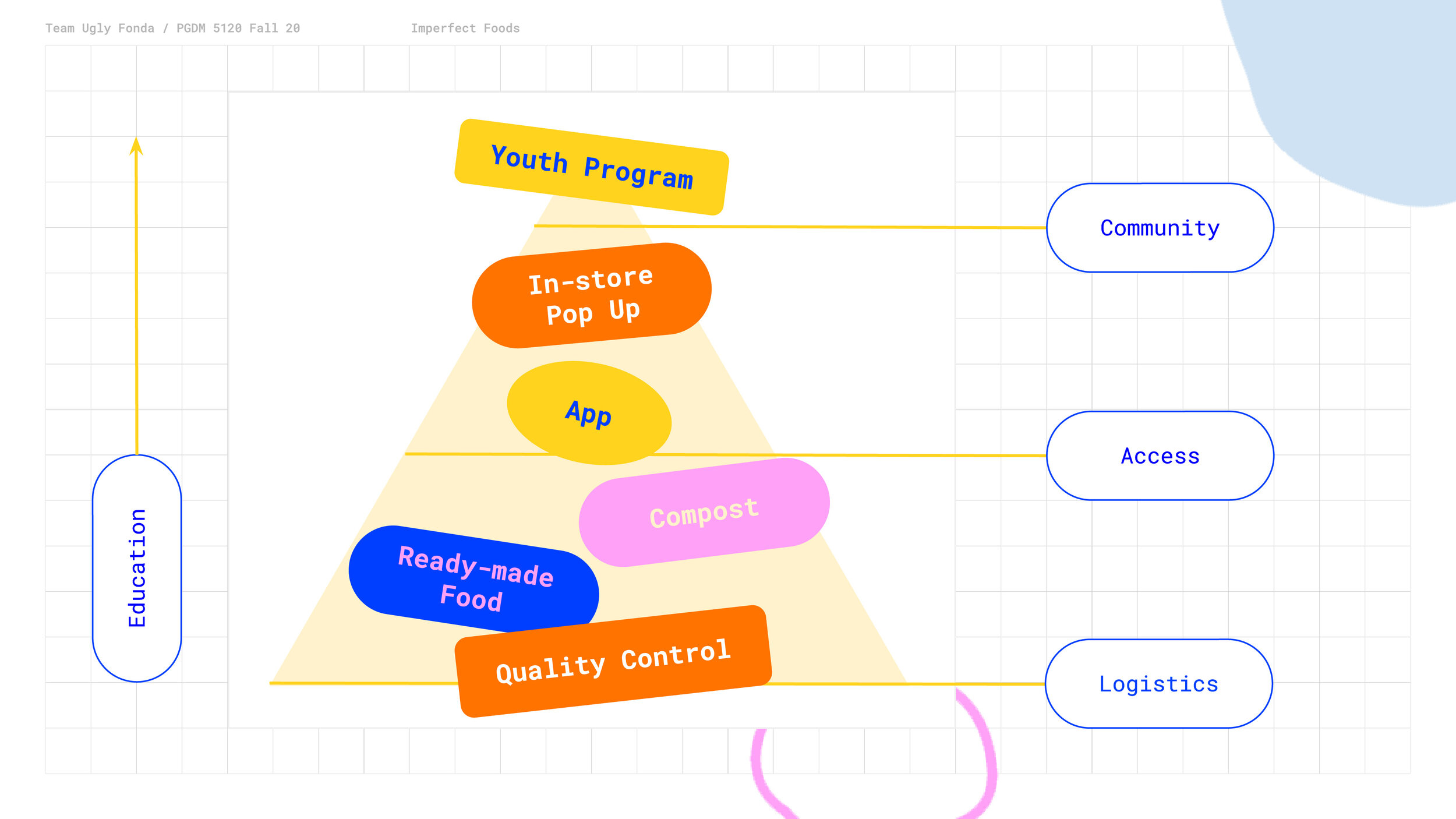
Quality Control
To value quality over quantity of produce, we built a grading scale chart for ensuring produce quality when sending out boxes to consumers:
Grade A. Irregular appearance but excellent nutrition value- box goes out the door.
Grade B. Stale appearance but still good nutritional value- juice it/soup it to sell as readymade house-brands.
Grade C. Rotten appearance and no nutritional value- compost it or use it for biofuel.
This requires education of composting and of reusing foods for other products like juices, broths, soups, pickled foods, sauces, and preserves, and such. This strategy will help Imperfect reduce waste, offer healthy & fresh foods at a convenience, and engage their consumers better with a wider variety of products.
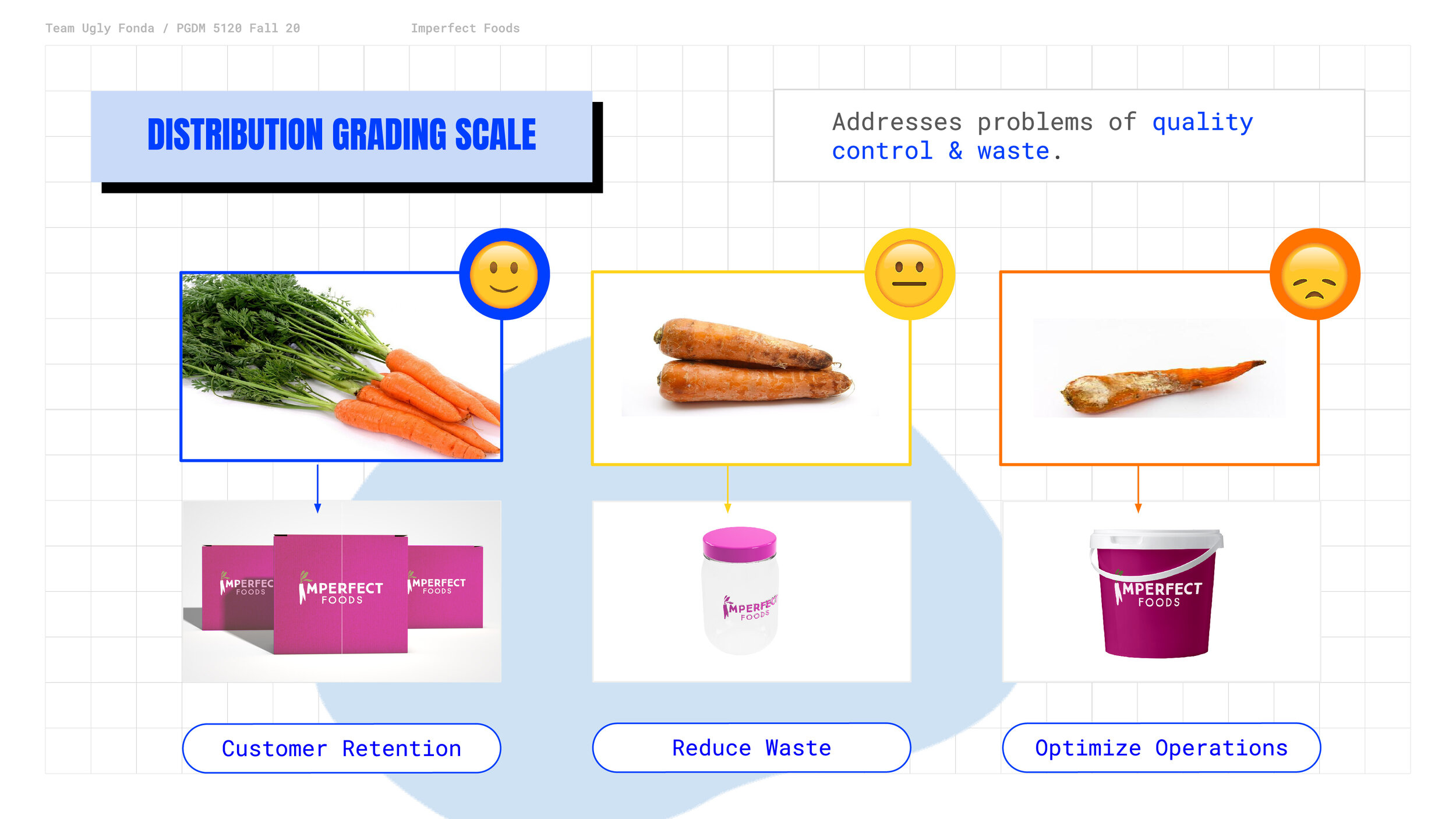
2. Compost System
Currently the Imperfect Foods delivery trucks return to the warehouses empty. With this new compost system, they could deliver better quality of services to their consumers and to the planet, all while maximizing efficiency. By providing compost pick-up services besides their produce box deliveries, Imperfect could promote easy at-home composting, thus further reducing waste. The compost driven back can either be used to produce biofuel to cut energy costs or be resold to farms making another stream of revenue.
This system requires educating people about composting- easy ways, benefits, and uses.
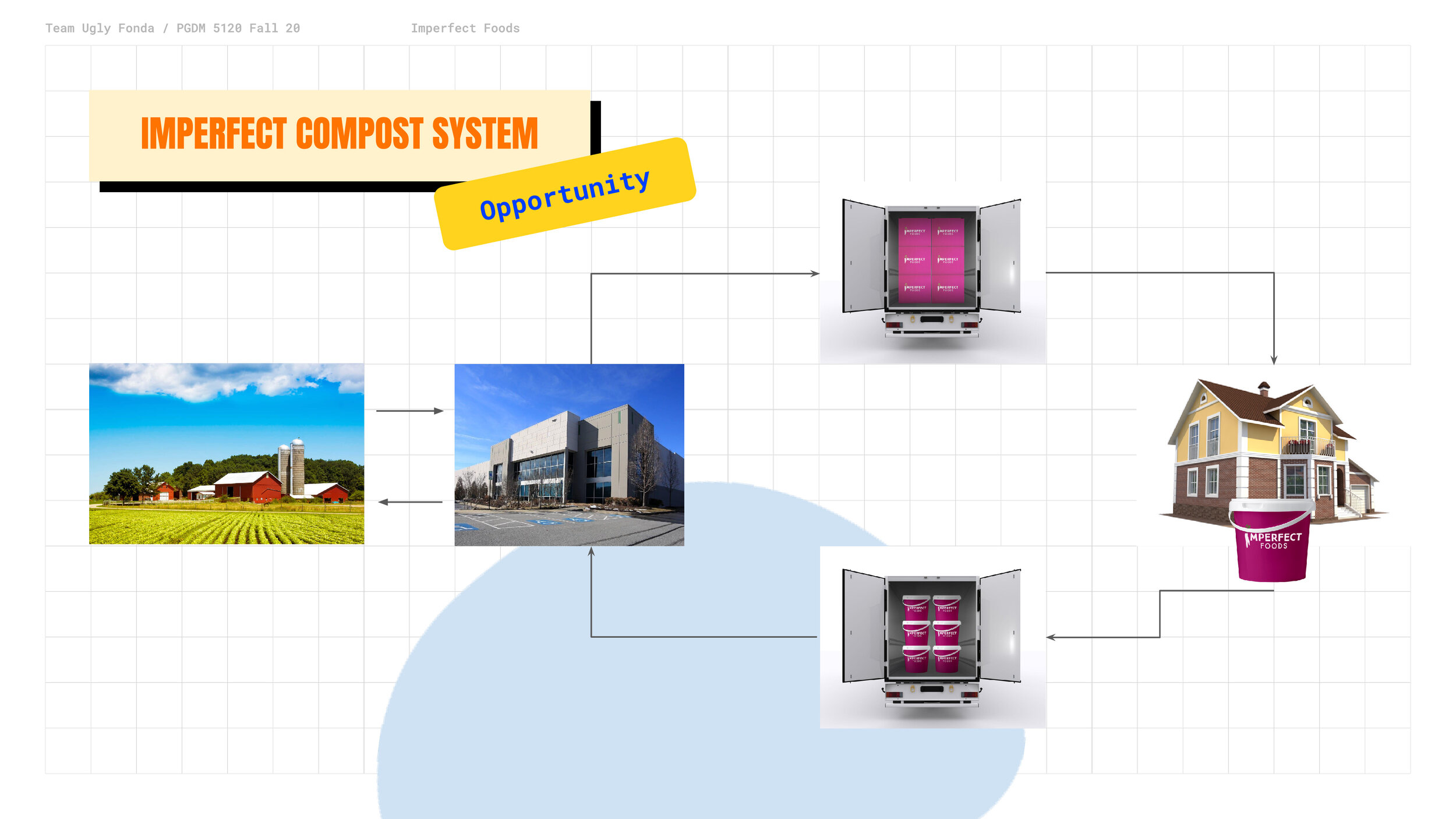
3. The App
Building a smartphone app for Imperfect can help make their existing consumers’ experiences seamless and attract in new ones by providing one easy access platform that gives visibility to all touch points.
Main Features:
Easy set-up screens
A family plan
A wishlist, substitution option, and finalize box.
Look up new healthy recipes
All-in-one calendar- schedule a delivery, track the order, and skip or un-skip a week
User-friendly customer service
The Imperfect Foods app will improve operations and customer retention by fixing pain points in the customer journey, increasing Imperfect’s footprint and access in food deserts, and increasing revenue streams while offering people information about a better food system.
4. Pop-Up Stores
The Imperfect Foods Pop-up carts to bodegas would be available to rent for monthly subscriptions. The carts will be modular so the bodega can select between a single, double or deluxe depending on how much square footage and customer traffic they attract and can be sized to meet demands. Each cart will be equipped with informational material, imperfect food branded tote bags, and Imperfect meal kits.
Every meal kit will include ingredients and instructions for a healthy recipe to serve at least two.
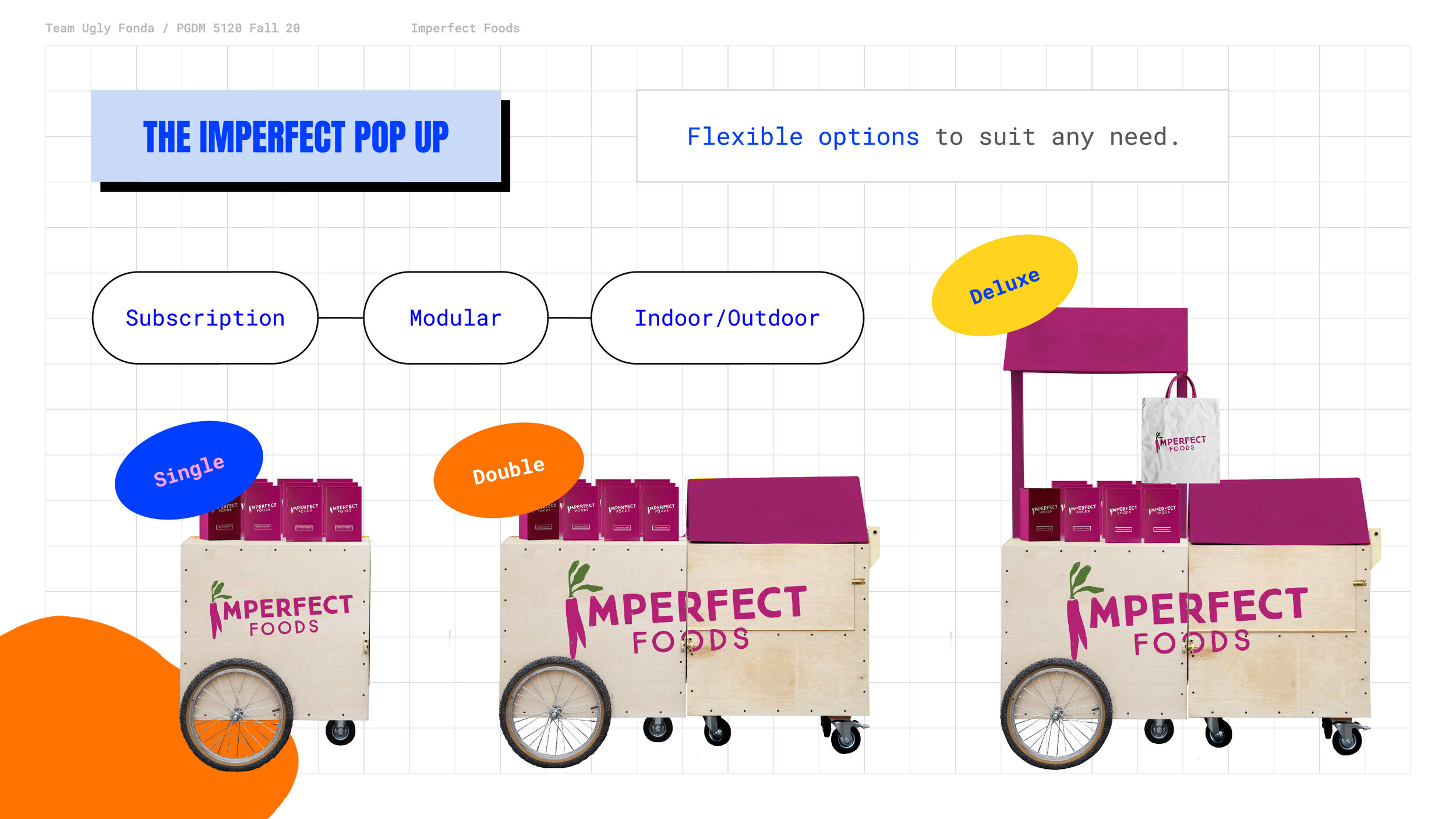
Through the bodega pop-ups, Imperfect Foods will expand their footprint and add new distribution channels and revenue streams. It will be a gateway for bodega shoppers to turn into online subscribers, and bodegas would in turn receive a new revenue stream by selling kits at wholesale cost for maximum return on profits. The community within food deserts would gain access to healthy and fresh produce building a better food system together.
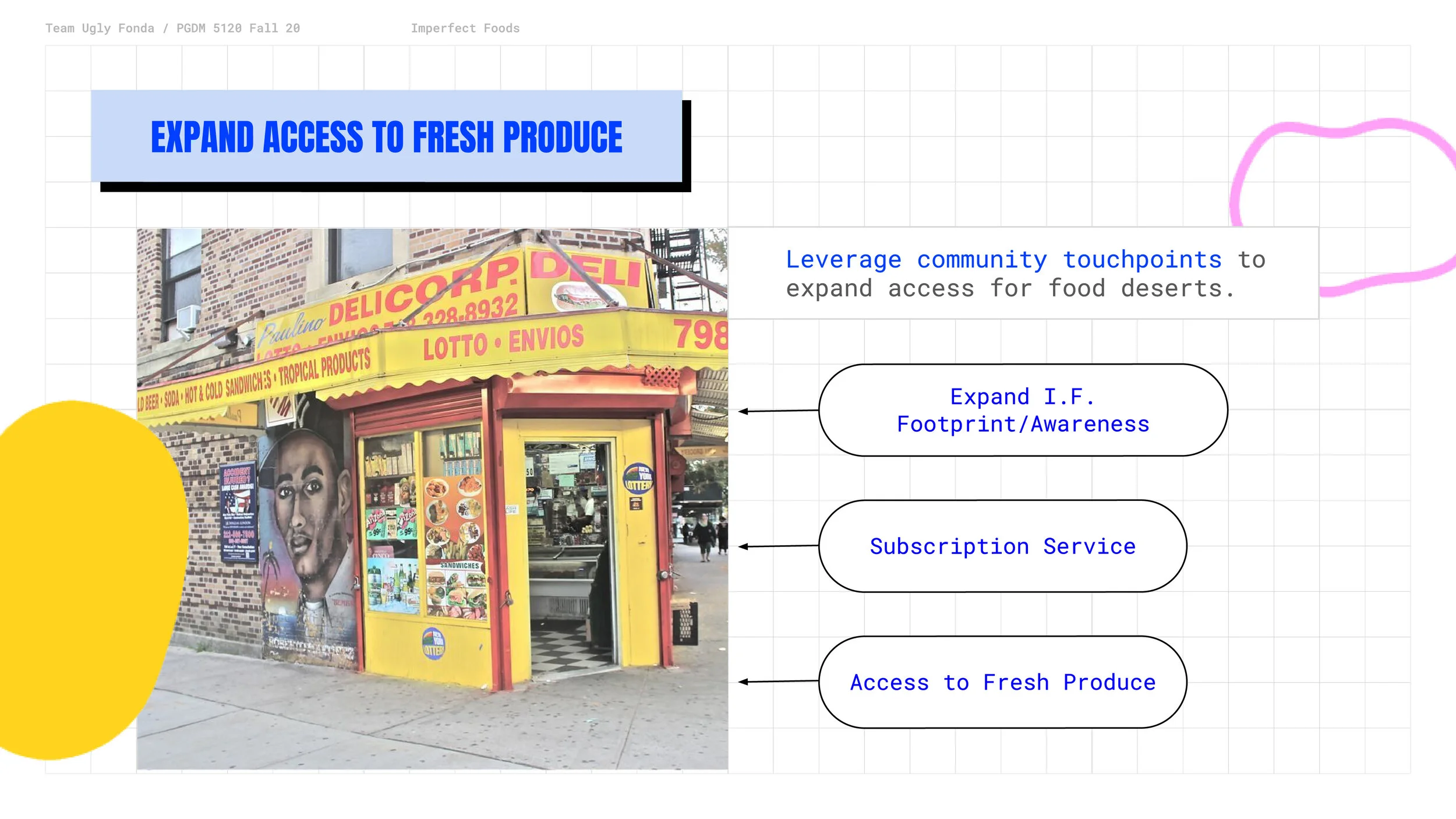
5. Youth Program
A partnership with Grow NYC in the South Bronx, NY, a non-profit organization dedicated to the improvement New York City's quality of life through environmental programs- including farmers' markets, community recycling, gardening, and environmental education.
Partnership:
GrowNYC has an established reputation and connection to local communities, deep expertise on education and environmental program management, and . This facilitates Imperfect getting aligned with an established, trusted local organization.
It will expand an already established program with the addition of an internship opportunity for teens with Imperfect Foods, informational courses on food consumption and health, and field trips to distribution centers and partnering farms to understand the entire food system from distribution and waste to market and business.
Results
Larger Footprint & Customer Segments
These prototypes created with a focus on equity and quality, will enable Imperfect foods to retain current customers, tap in new ones and other community segments, make fresh food accessible to food deserts, and have multiple revenue streams, all while educating people.
By implementing these strategies, Imperfect Foods can open up to a vast number of customer segments that are currently being neglected. This is where it could be!
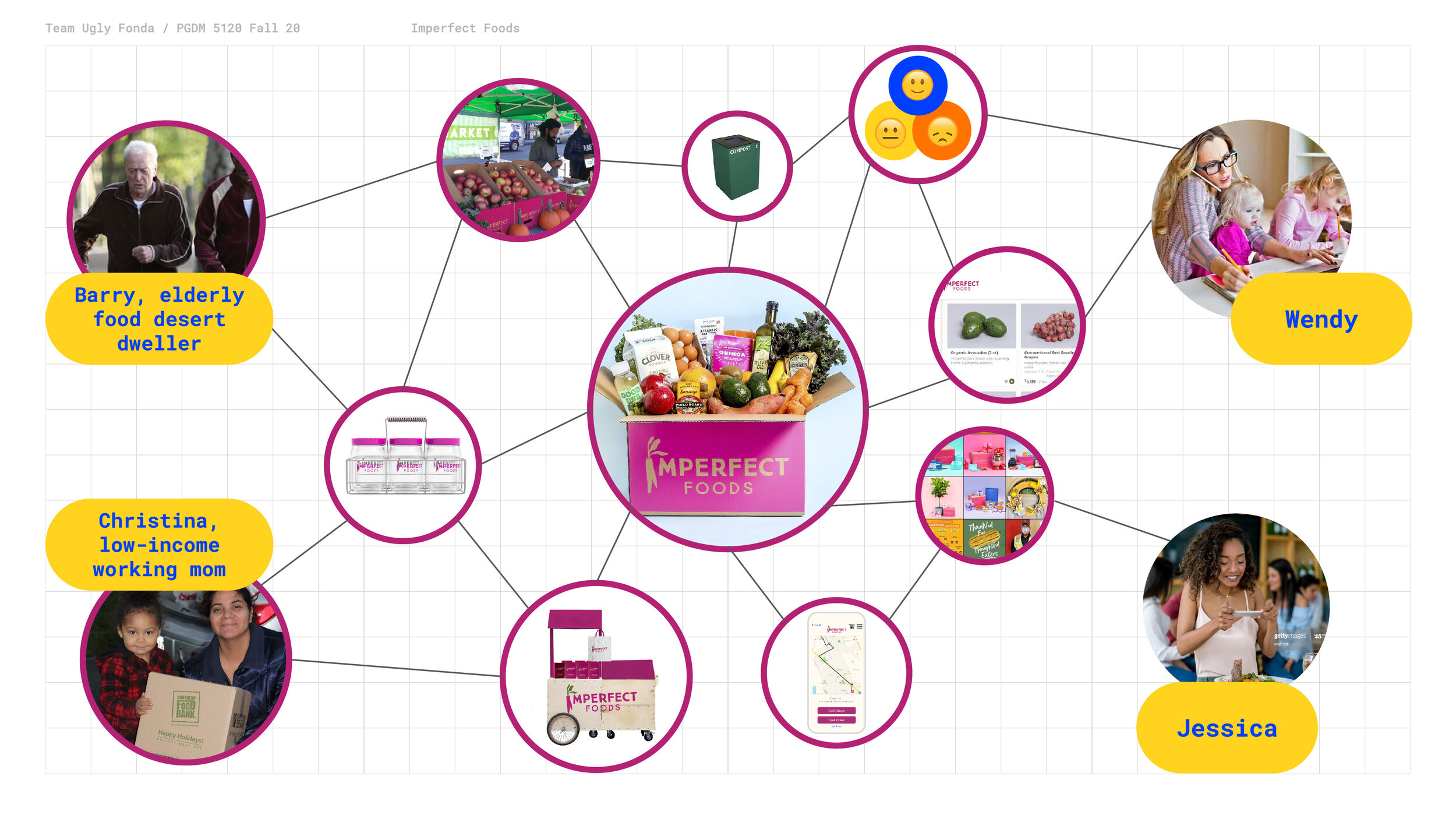
Building a perfectly Imperfect world through circular business model
